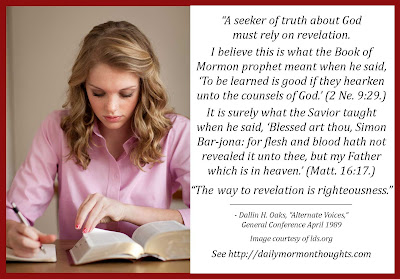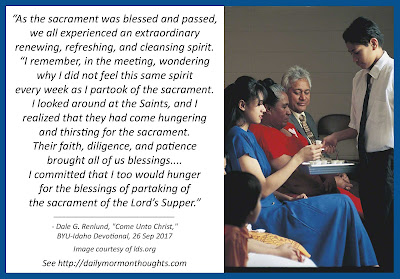"We would, if we could, leave our families a legacy of testimony that it might reach through the generations.
"What we can do to create and transmit that legacy comes from an understanding of how testimony is instilled in our hearts. Since it is the Holy Ghost who testifies of sacred truth, we can do at least three things to make that experience more likely for our families. First, we can teach some sacred truth. Then we can testify that we know what we have taught is true. And then we must act so that those who hear our testimony see that our actions conform with what we said was true. The Holy Ghost will then confirm to them the truth of what we said and that we knew it to be true.
"That is how a legacy of testimony is created, preserved, and transmitted in a family. It isn’t easy, but ordinary people have done it....
"Some of the greatest opportunities to create and transmit a legacy of testimony cannot be planned. Tragedy, loss, and hurt often arrive unanticipated. How we react when we are surprised will tell our families whether what we have taught and testified lies deep in our hearts. Most of us will have taught our children of the power of the Savior to carry us through whatever befalls us....
"When tragedy strikes or even when it looms, our families will have the opportunity to look into our hearts to see whether we know what we said we knew. Our children will watch, feel the Spirit confirm that we lived as we preached, remember that confirmation, and pass the story across the generations."
- Henry B. Eyring, "A Legacy of Testimony," General Conference April 1996
Click here to read or listen to the full talk
When you have something precious and dear to you, the greatest desire is to share it with those you love most. Lehi displayed this principle; in the midst of his heavenly vision, as he discovered and partook of the fruit that was sweet and white and filled his soul with "exceedingly great joy," his first reaction was, "I began to be desirous that my family should partake of it also" (see 1 Nephi 8:10-12). He wanted to share the precious gift with those who mattered most to him.
President Eyring suggests ways to share the precious gift of testimony with those we love most. It's a simple process of teaching, testifying, and demonstrating:
Though the first two steps set the stage and allow the Holy Ghost to accompany teaching, it might be the third step that is the most important in helping to confirm our words. That's where we demonstrate that it's more than a learned concept or a passing idea we are describing; it's a fundamental part of our being in which we live and follow the principles and see their true fruit. Then our family can realize that the principle really matters to us, and feel confirmed in their hearts the truthfulness of our words.
(Compilation and commentary by David Kenison, Orem, Utah, 2018)

































